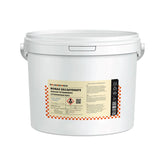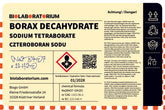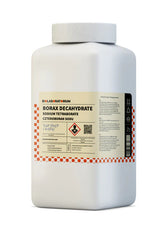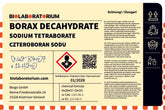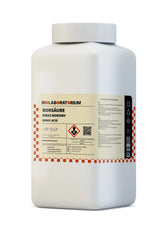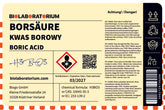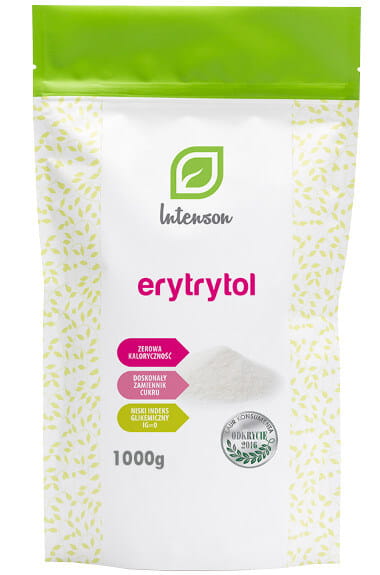Erytrol - erythritol 1kg sweetener 1000g INTENSON
- Regular price
- €21,90
- Regular price
-
- Sale price
- €21,90
- Unit price
- per
Couldn't load pickup availability
Description
xDESCRIPTION
Erythritol 1kg Table Sweetener 1000g Intenson
-a sweetener that has only 0.2 kcal
-has a glycemic index of zero
- inhibits the action of bacteria that cause caries in the teeth
- a perfect substitute for traditional sugar
Erythritol is a natural, low-calorie sweetener belonging to the group of polyhydroxy or sugar alcohols. It occurs naturally in fruits such as melons, pears, and grapes, as well as in corn, algae, lichens, and red wine. Erythritol has a slightly sweet taste. When consumed, it leaves a slightly cooling sensation in the mouth. It has a glycemic index of zero and therefore does not raise blood glucose levels. 1g of erythritol has only about 0.2 kcal, which is why it is referred to as a "zero-calorie sweetener." Among available sweeteners, this is the lowest-calorie option, with virtually no nutritional value, making it ideal for calorie control and reduction.
In industry, it is obtained through fermentation, the same process used to make cheese, but instead of milk, fruit is used. Another method of production is the use of glucose and various types of yeast or glycerin, also using microorganisms, in this case Yarrowia lipolitica.
It is used in baking and cooking, reducing the calorie content of prepared dishes. After ingestion, it is quickly excreted from the body. It can be used by diabetics. The advantage of this product is that it does not have a laxative effect even in large quantities. Erythrol is not metabolized by our body, as we do not have the enzyme to break it down in our body. It is almost completely excreted and does not affect the intestinal flora at all. It can be used as a substitute for traditional sugar, very similar in appearance. It is perfect for sweetening coffee, tea, desserts, and as an ingredient in cakes. Erythritol, on the other hand, is less sweet, having about 60-70% the sweetness of sucrose (sugar), which must be taken into account in recipes when replacing these products.
Erythritol has a positive effect on our body by acting as an antioxidant and protecting our teeth. As an antioxidant, it binds to free radicals and protects our body from their harmful effects. It also has the ability to inhibit the fermentation of sugars caused by bacteria of the genus Streptococcus, which can cause tooth decay.
In food, erythritol is increasingly used in the production of healthy sweets, jams and candied fruits, chewing gum, and dietary supplements for people who must eliminate sugar from their diet. It serves not only as a sweetener, but also as a flavor enhancer, thickener, and as a substance that prevents changes in the product's consistency, color, and flavor.
INTERESTING
Listed in food composition as E968
When replacing sugar with erythritol, we should use the ratio: replace 5 g of sugar with about 7 g of erythritol.
It is often added to other sweeteners such as aspartame in products to eliminate their undesirable aftertaste and enhance their sweet taste. In cosmetics, it is used as a substitute for glycerin, which acts as a preservative, protecting the product from spoilage.
INGREDIENTS
100% erythitol.
Nutritional value per 100 g
| Energy value | 0 kJ / 0 kcal | tr
| Fat | 0 g |
| Carbohydrates, including: - Sugar, - Strength, - Polyols |
99 g 0 g 0 g 99 g |
| protein | 0 g |
APPLICATION
It can be used in cooking, baking, or sweetening, reducing the calorie content of prepared foods. Keep in mind that it's not as sweet as regular sugar, reaching about 75% of its sweetness.
ALLERGEN INFORMATION
Manufactured in a facility that contains nuts, peanuts, sesame and products containing sulfur dioxide, gluten, eggs, milk, celery.
similar products
- Regular price
- €21,90
- Regular price
-
- Sale price
- €21,90
- Unit price
- per
- Regular price
- €21,90
- Regular price
-
- Sale price
- €21,90
- Unit price
- per
- Regular price
- €21,90
- Regular price
-
- Sale price
- €21,90
- Unit price
- per
- Regular price
- €21,90
- Regular price
-
- Sale price
- €21,90
- Unit price
- per
- Regular price
- €21,90
- Regular price
-
- Sale price
- €21,90
- Unit price
- per
- Regular price
- €21,90
- Regular price
-
- Sale price
- €21,90
- Unit price
- per
- Regular price
- €21,90
- Regular price
-
- Sale price
- €21,90
- Unit price
- per
- Regular price
- €21,90
- Regular price
-
- Sale price
- €21,90
- Unit price
- per
- Regular price
- €21,90
- Regular price
-
- Sale price
- €21,90
- Unit price
- per
- Regular price
- €21,90
- Regular price
-
- Sale price
- €21,90
- Unit price
- per
Recently Viewed Products
- Regular price
- €21,90
- Regular price
-
- Sale price
- €21,90
- Unit price
- per
- Regular price
- €21,90
- Regular price
-
- Sale price
- €21,90
- Unit price
- per
- Regular price
- €21,90
- Regular price
-
- Sale price
- €21,90
- Unit price
- per
- Regular price
- €21,90
- Regular price
-
- Sale price
- €21,90
- Unit price
- per
- Regular price
- €21,90
- Regular price
-
- Sale price
- €21,90
- Unit price
- per
- Regular price
- €21,90
- Regular price
-
- Sale price
- €21,90
- Unit price
- per
- Regular price
- €21,90
- Regular price
-
- Sale price
- €21,90
- Unit price
- per
- Regular price
- €21,90
- Regular price
-
- Sale price
- €21,90
- Unit price
- per
- Regular price
- €21,90
- Regular price
-
- Sale price
- €21,90
- Unit price
- per
- Regular price
- €21,90
- Regular price
-
- Sale price
- €21,90
- Unit price
- per
- Choosing a selection results in a full page refresh.

